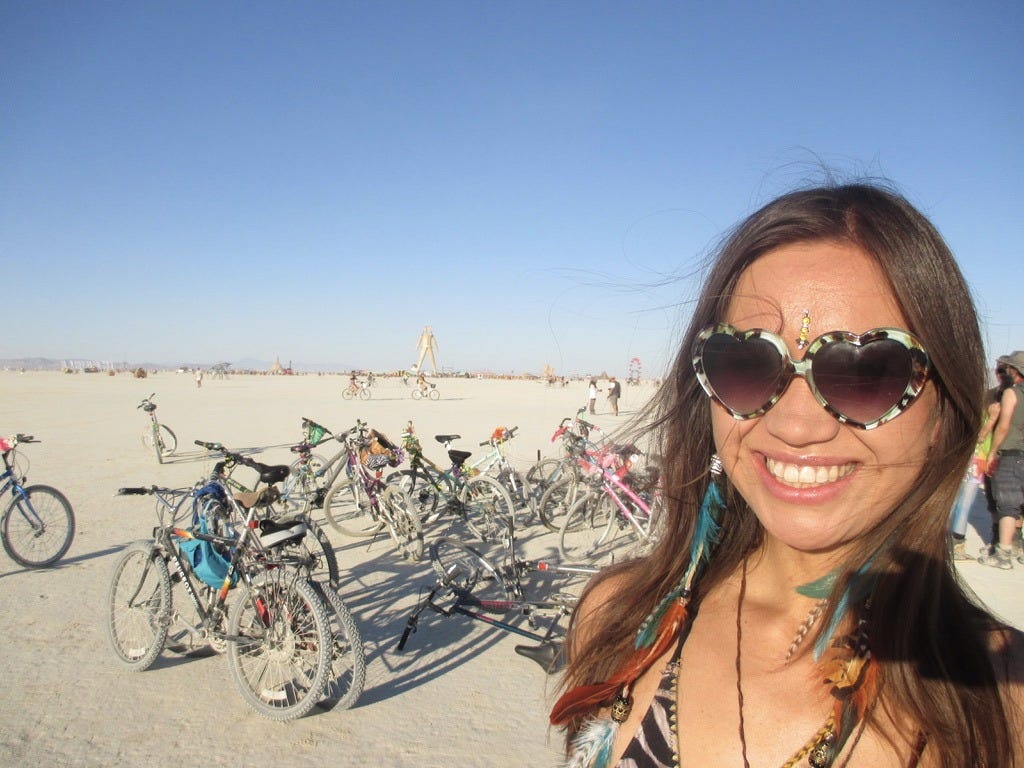The thrill of the new
Some HSPs love to chase excitement. For these "High Sensation Seekers," balance can keep burnout at bay.
Welcome to my weekly newsletter building a supportive community for Highly Sensitive People.
When I was in my twenties, I had a constant push-pull feeling. Part of me craved structure and downtime alone — classic traits of a Highly Sensitive Person (HSP). But a restless “wild horse” part would show itself from time to time and I would get desperately bored — even panicked — at the prospect of mundane routine.
I moved many times, and constantly changed psychology jobs. I burned the candle at both ends — exploring the night life and music in my new neighbourhood, or heading off with my backpack to festivals. It was a lot of fun, but as I learned — sometimes the hard way — the challenge is to satisfy that impulse without burning out.
Now that I have a young daughter, I’ve naturally had to lean more towards routine. But I still feel that inner tension, and I make sure to find ways to honour my love of stimulation and novelty. My clubbing days might be (mostly) over, but I take great pleasure in things like taking the odd weekend away to study sound healing; planning family trips to a new part of the UK; joining a tap dancing class or exploring visionary new approaches to supporting my coaching clients.
“High Sensation Seekers”
It was only as I dived deeper into understanding sensitivity that I realised I belong to a subset of HSPs known as “High Sensation Seekers” — a category created by American psychology professor Dr Marvin Zuckerman in the 1960s. High Sensation Seekers — as the term suggests — thrive when engaged in exciting, novel experiences, and are driven by curiosity and an openness to all that the world has to offer.
If you’re wondering whether the concept might be helpful to understand yourself better, Dr Elaine Aron, the American psychologist who pioneered research into HSPs, has a simple online High Sensation Seeker test that only takes a few moments. Researchers reckon that about 20-30% of the population are HSPs — and that 30% of HSPs are High Sensation Seekers.
I learned a lot from the 2016 book Thrill! The High Sensation Seeking Highly Sensitive Person by Dr Tracy Cooper:
The book builds on research by Dr Zuckerman, who developed a way to assess High Sensation Seeking using four subscales:
Thrill and adventure seeking: Love of daredevil sports such as ice climbing or skydiving, or adventurous travel.
Experience seeking: Frequently moving cities and countries, or changing jobs. Also covers enjoyment of rousing music and art, and a reluctance to re-read a book or watch a film more than once. This trait can also show up as joining groups on the fringes of conventional society.
Disinhibition: Focused on willingness to act outside of social norms — such as by taking psychoactive substances to pursue expanded states of consciousness, or through parties, illegal drugs, alcohol and sex.
Boredom susceptibility: Individuals who score highly on this scale have a low tolerance for routine work and tedious conversation.
Coach Patricia Young has an excellent interview with Dr Cooper on the Unapologetically Sensitive podcast here.
Striking a balance
As with all aspects of being an HSP, the key is balance.
If we allow our High Sensation Seeking side to run our lives, we crash with exhaustion. But if we defer too much to our HSP tendencies to over-analyse and cocoon ourselves, we can give in to procrastination and miss opportunities to grow.
Here’s some suggestions for ways to navigate as a High Sensation Seeking HSP. As always, I love to hear how you’re managing in the comments (and please do share The HSP Revolution with anyone who you think might find it helpful).
Plan ahead: If you know you’re going to be engaging in High Sensation Seeking-style activities, then structure plenty of recovery time afterwards to ground and process to minimise the risk of overwhelm.
Ride the waves: At times, you will feel a greater call to adventure; at others you may need more time and space than usual to avoid overwhelm. Pay attention to these rhythms — without taking either thrill-seeking or cocooning to an extreme.
Flexibility at work: HSPs typically tend to enjoy a high degree of autonomy and self-direction at work, and this can be particularly true of High Sensation Seekers. After years of working in the National Health Service and local government services, I realised a few years ago that I was more suited to self-employment, and now work as a coach specialising in working with sensitive adults and children.
Know thyself: Cooper’s book helped me to understand that the push-pull I felt was part of my personality — there was nothing “wrong” with me, and nothing that needed fixing. Reading more about High Sensation Seeking through books and blogs can help you understand yourself better and resist the urge to compare yourself with friends or family members who may have very different personality traits.
Remember the introverts: People tend to associate thrill-seeking with extraversion. But introverts can also be High Sensation Seekers — which may manifest as a constant search for new experiences and change.
Sharing this a little later than usual — my March HSP check-in, where I explore:
Media diet: Staying informed without burning out.
Observe and allow the change: Take time to focus on what changes are going on in your life — both internal and external — and how you can embrace (not resist) them.
Your plans and visions: Continue thinking more concretely about what you want to achieve for the rest of the year.
Grounding: How do you find inner equilibrium, grounding and balance during these challenging times.
I hope you are staying safe and well, and thank you for being part of The HSP Revolution community.
See you next week,




![Thrill: The High Sensation Seeking Highly Sensitive Person by [Tracy Cooper] Thrill: The High Sensation Seeking Highly Sensitive Person by [Tracy Cooper]](https://substackcdn.com/image/fetch/$s_!pJNK!,w_1456,c_limit,f_auto,q_auto:good,fl_progressive:steep/https%3A%2F%2Fbucketeer-e05bbc84-baa3-437e-9518-adb32be77984.s3.amazonaws.com%2Fpublic%2Fimages%2F9f668aca-42bf-44d5-acc3-979820e5da6a_334x500.jpeg)



Dear Dr Genevieve,
I found your newsletter really fascinating!
I was drawn to your work because I suspected I was an HSP however something didn’t fit because of my desire for adventure, excitement and loud music.
I also experience long periods of isolation then a desire to seek thrills and adventure; it’s a ripsaw back and forth between the two extremes, as you explained.
I thrive being in quiet solitude for days, beachcombing, gardening, reading, and playing my guitar. Then I feel a great urge to strap myself into a paramotor, hire a motorbike for the week, and attend an air show, rock concert or travel to the other side of the world to a remote region. I can’t predict how I’m going to feel, I’m trying to integrate these different aspects.
Yesterday I bought Dr Coppers audio book and went for a walk, when I returned home I took Dr Aron’s self tests scoring 25 for HSP and 15 for HSS, so now I feel I’m in the club!
I also watched the documentary Sensitive - The Untold Story. Which was further enlightening.
It’s great to learn that my experiences are due to a trait, which has its benefits, plus I recall that there are 1.4 billion of us which is great to know!
Best Wishes
Matt